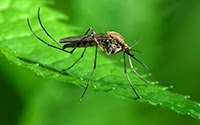FTC warns online marketers about claims of Zika protection

consumer concerns” about the Zika virus, so the Federal Trade Commission has sent letters to 10 of them warning that “Zika protection claims must be supported by competent
and reliable scientific evidence in the form of well-controlled human
clinical testing,” the FTC said in a news release this month.
 |
| Some mosquito species carry Zika better than others. |
“The products of concern include wristbands, patches, and stickers that
purportedly can repel the mosquitoes that carry Zika or otherwise protect
users from the virus,” the FTC said. “The letters also point out that the testing
supporting claims of protection from the Zika virus must use the
mosquito species that are able to carry the virus, and must be able to
demonstrate that the repellent effects last as long as advertised.”
The agency “is concerned that some products don’t work as advertised,” FTC consumer education specialist Aditi Jhaveri wrote on the agency’s Consumer Information blog. “To prevent mosquito bites, the Centers for Disease Control and Prevention recommends using skin-applied insect repellents registered with the Environmental Protection Agency with certain active ingredients. The EPA also has registered products to treat clothing and gear. These registered products have been evaluated by the EPA for safety and effectiveness.”
The EPA registry is searchable by type of insect, active ingredient, company name and the length of time protection is needed.
“If you’re considering an all-natural repellent — or a wristband or sticker — not registered with the EPA, know that the CDC and EPA don’t speak to their effectiveness,” Jhaveri wrote. “And if you’re a parent, know that certain ingredients aren’t safe for children under 3 — even if they’re advertised as all-natural. Here’s more from the EPA on using repellents safely and effectively.